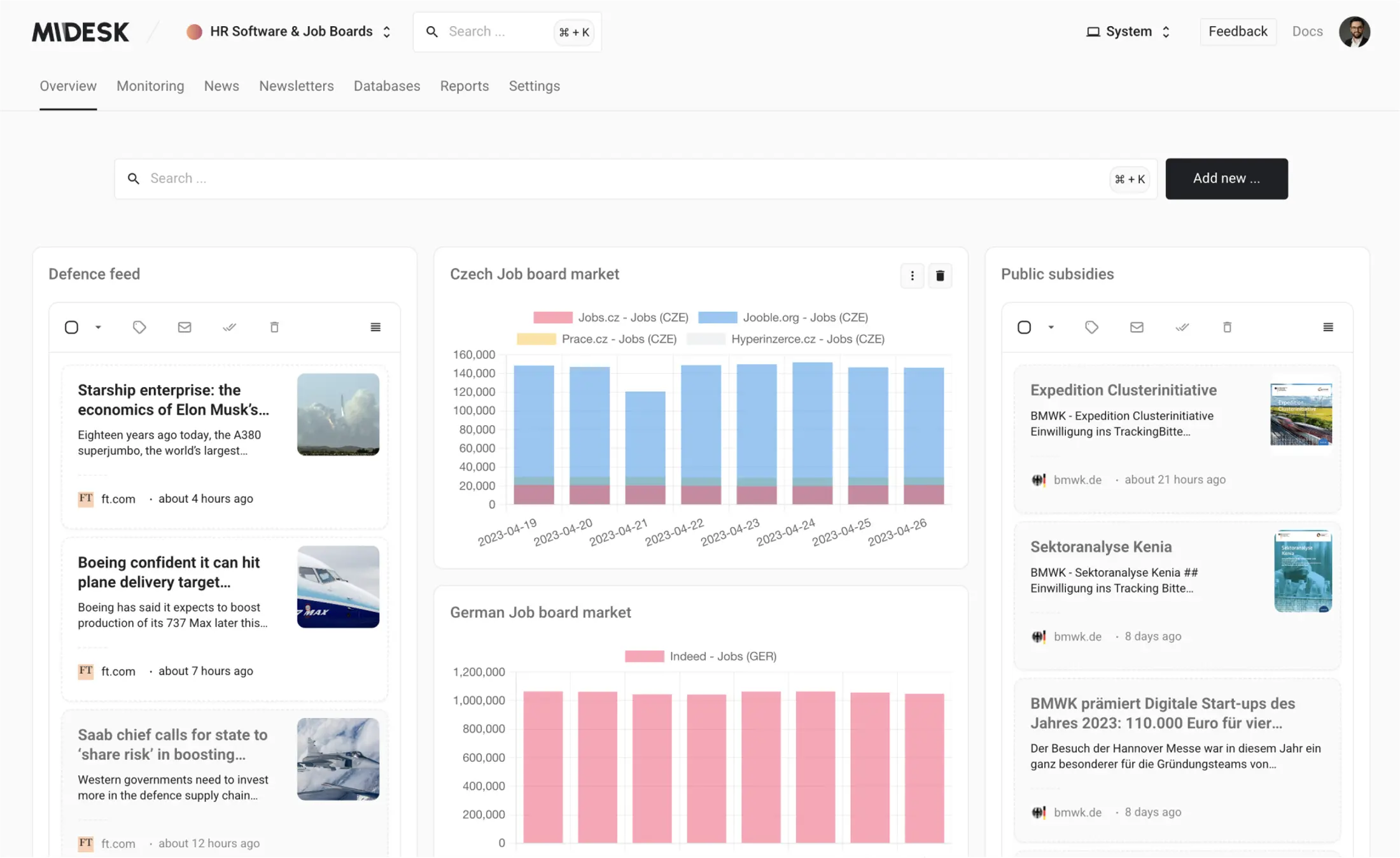Midesk vs Google Alerts
Simple email alerts for web mentions.
Free tool from Google that monitors public web content and sends email alerts when new results for chosen keywords appear.1
Switching from Google Alerts? Midesk adds multi-source scraping, adaptive clustering and AI-ready briefs so research teams can ship board updates in hours instead of days.
Vendor logo hidden until usage permissions are confirmed (uncertain).
Why teams switch from Google Alerts
- Alerts frequently return irrelevant results and miss important updates; a Contify study found that only 10 % of updates were business relevant while 40 % of relevant updates were missed.2
- The service cannot disambiguate keywords (e.g., “SEO” vs Korean celebrities) and offers limited filtering; users report a barrage of unwanted results and no case-sensitive options.2
- Alerts are delivered only by email and cannot be clustered, summarized or exported into executive-ready briefs; Midesk provides AI‑written briefs with clustering and citations.3
- Google Alerts monitors only public web sources and does not cover filings, tenders, job boards or competitor websites; Midesk ingests these sources via news monitoring and scraping.45
Stick with Google Alerts if…
- You only need a free, lightweight tool to notify you of new web mentions by email.
- Your monitoring requirements are limited to a few simple keywords and sources.
Choose Midesk if…
- You require high‑signal, deduped coverage across news, filings, tenders and competitor data.
- You want narrative briefs with clustering, sentiment and export options for stakeholders.
Where Google Alerts excels
- Monitor the web for new content matching chosen keywords and receive alerts via email.1
- Configure frequency (as-it-happens, daily or weekly) and choose result quality (“all results” or “only the best”).1
- Select sources such as automatic, news, blogs, web, video, books, discussions or finance, and filter by language and region.1
- Set delivery time and opt to receive all alerts in a single digest email.1
Typical Google Alerts use cases
Personal reputation monitoring
Track mentions of your name or organisation across public web content and receive notifications via email.1
Basic topic tracking
Follow keywords or phrases to stay informed about new articles or blog posts on those topics.1
Content discovery
Get periodic emails about new web content in selected categories such as news or blogs for research purposes.1
Best suited for
- Individuals and small teams needing simple, free monitoring for a few keywords.
- Users comfortable receiving raw links via email without clustering or analysis.
Not the right fit when
- Market-intelligence teams requiring deduplication, sentiment analysis or clustering.
- Organisations needing to monitor regulatory filings, tenders or competitor KPIs.
Comparison
Pricing snapshot
- Free
Unlimited number of alerts delivered via email at no cost.
Common integrations
Migration playbook
- 1List your existing Google Alert keywords and frequency settings.
- 2Create equivalent monitoring jobs in Midesk to ingest news and blog sources for those topics; use the language and region filters as needed.4
- 3Configure Midesk scraping recipes if you need to monitor competitor websites, job boards or tenders related to those topics.5
- 4Build AI news briefs in Midesk to classify, cluster and summarise the incoming signals; schedule digests via email or Slack and deactivate Google Alerts.3
See it in action
Analysts monitor KPIs, competitor moves, and MCP-ready briefings inside the Midesk workspace.

FAQ
- Is Google Alerts free?
- Yes. Google Alerts is a free service that allows users to create and receive email notifications for chosen keywords.1
- Why do my Google Alerts contain irrelevant results?
- Google Alerts provides simple keyword matching without advanced disambiguation; a Contify study found that 90 % of updates were irrelevant and 40 % of relevant business updates were missed.2
References
Last reviewed 02/11/2025
- 1. Alerts – monitor the web for interesting new contentGoogle02/11/2025Visit source
- 2. How do Google Alerts work and why they don’tContify20/08/2025Visit source
- 3. AI News Briefs — Executive-Ready IntelligenceMidesk01/01/2025Visit source
- 4. News Monitoring & Management OverviewMidesk01/01/2025Visit source
- 5. Web & Data Scraping in Competitive & Market IntelligenceMidesk01/01/2025Visit source
Related alternatives
AI-powered market research platform that aggregates over 500 million premium business and financial documents and uses generative AI to synthesize insights across them.[ref:alphasense-platform]
Read comparisonConsumer‑intelligence platform that collects and analyzes millions of social conversations across digital channels, using AI to surface insights and trends.[ref:brandwatch-consumer]
Read comparisonAll‑in‑one PR and media‑intelligence platform that delivers real‑time monitoring across traditional, digital and premium sources, with AI‑powered metrics and outreach tools.[ref:cision-media-monitoring][ref:cisionone-overview]
Read comparisonFormer content‑curation and collaboration platform that helped teams discover, organize and share information using personalized feeds and boards; the company has been discontinued.[ref:tracxn-cronycle][ref:saascounter-cronycle]
Read comparisonAI‑powered market‑intelligence service built on top of Feedly that scans thousands of trusted sources, surfaces emerging trends and lets teams curate insights via dashboards and newsletters.[ref:feedly-ai-feeds]
Read comparisonMedia‑intelligence platform that monitors news, social media, broadcast and podcasts across hundreds of thousands of sources and provides alerts, sentiment and trend analysis.[ref:meltwater-coverage][ref:softwareone-meltwater]
Read comparison